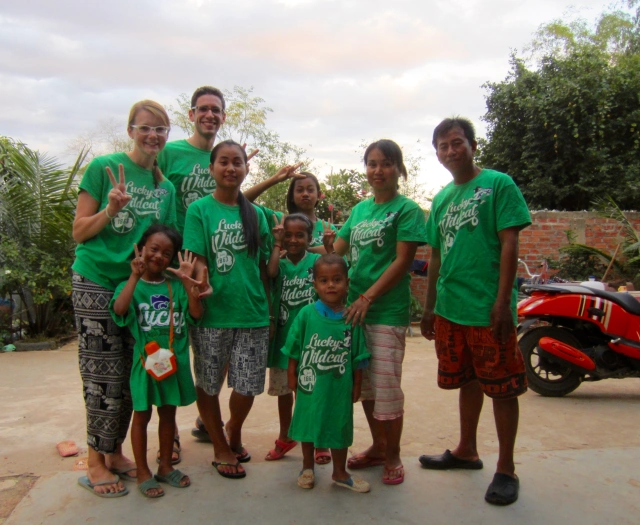The Bruneels in Cambodia
In the news —
A decade after applying, Mr. Bruneel reflects on his family’s experience in the Peace Corps

English teacher Matthew Bruneel and his wife Leshia with their host family during their time in the Peace Corps in Cambodia.
SEPTEMBER 6, 2023
After establishing a successful early start to his teaching career at Whitman, English teacher Matthew Bruneel put his Maryland life on pause in 2014 to venture to Cambodia alongside his wife Leshia. The next two years would be filled with adjusting to the culture in a village, living with limited money and experiencing life-changing moments in the Peace Corps.
The Peace Corps is a government agency first founded in 1961 with the mission to work on important, sustaiable projects in local communities around the world and build relationships while exchanging culture.
Studying abroad in Spain during college, Bruneel first met Leisha, who inspired him to join with her. The process of applying consisted of a medley of interviews and essays, he said, and after a year of waiting, the Bruneels found out they were going to Cambodia four months before the departure date.
They were overjoyed, and the Peace Corps quickly arranged training to teach them the Khmer language before they would teach Cambodian children English.
“If you want to become very good at a language very quickly, you can’t do much better than Peace Corps language training,” he said. “I was fluent because they needed everyone to be.”
After arriving in Cambodia, the Bruneels immersed in the colorful culture first at a hotel to acclimate briefly for three days, and then with host families. They began a blog to document their experiences.
They stayed an hour apart for the first nine weeks but were able to still see each other each Sunday. The Peace Corps provides workers with a stipend aligned with the same income as locals in the country they’re serving, so the Bruneels each made about $200 a month.
“We gave some of it to our host family to pay them, so I think we ended up with $120 of spending money each month,” Bruneel said. “We ate as the locals ate and we traveled as the locals traveled because that’s all we could really afford.”
Leshia wrote on their blog at the time, “We know that we’re here to learn something valuable and to do something meaningful, those things just haven’t become clear to us yet.”
By the tenth week, the Bruneels were once again living together with a new host family. Based on needs they identified, they began pursuing long-term projects both individually and together to help the communities of Cambodia that had already been so hospitable to them, they said. Bruneel mainly taught high school English, Leshia mainly worked at a health center bolstering pre-natal care and at an elementary school teaching health, and together as secondary projects, they helped to develop a leadership academy “Camp GLOW” — an acronym for “Girls Leading Our World” — and establish sustainable gardening practices for food security.
“Cambodians already know the basics of gardening,” Bruneel wrote. “What we can disseminate to them are cheap, organic strategies for keeping plants healthy.
The challenge of teaching the children in Cambodia was greater than anticipated, Bruneel said. Returning home two years later, the obstacles of teaching at Whitman were minuscule in comparison to the challenges of teaching in Cambodia.
“Being forced to push myself through so many challenges as a teacher has really made me so solid and equipped as a teacher here,” he said. “I think in general now, I’m less rattled by unexpected things.”
Eventually, the journey reached its end, and the Bruneels returned. Despite what some might expect from returning to Bethesda, Bruneel didn’t necessarily take comfort in what appears to be economic richness upon his return. Overall, he felt how isolating America can truly be after spending so many months in Cambodia’s welcoming culture.
“I think the assumption would be you come back and you’re sort of shocked at the wealth and privilege, and I don’t really think that was my takeaway,” he said. “It was 2016 when I was coming back and just sort of sad. I looked around, and it’s funny how much the cars differed in American culture. We drive in our cars, but we do not interact at all. They’re these hermetically sealed chambers, whereas in Cambodia, everybody will be riding motos and you talk and wave to each other as you stop.”
Working at the Peace Corps is not a job for everyone — the experience is irreplaceable, but being in a foreign area strips people down to their truest self, Bruneel said.
“I do think everybody should seek to serve their communities however they can, but the Peace Corps doesn’t demand a kind of readiness of just grit. You really have to see your most weak, feeble self and all your vulnerabilities,” he said. “I think it’s very valuable and life-changing to look at yourself in that way in such a moment of self-reliance, but I don’t think everybody has to go.”
Overall, Bruneel described his days in Cambodia as an eye-opening, immersive time in another culture. After eating Cambodian food, and trying delicacies including insects and spiders, biking everywhere and a humbling experience teaching, Bruneel was filled with the new experience and knowledge he had hoped to earn.
“Being in a foreign place and being open to it is the biggest learning experience,” Bruneel said. “Having knowledge of how life flows and exists in another part of the world is so valuable. You can’t really know that it’s the right way of living life until you’ve lived it in different ways.”

No comments yet.
Add your comment